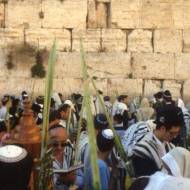

By Rabbi Ari Enkin, Rabbinic Director, United with Israel
Every nation, Jewish or not, has a place with God and the Holy Temple in Jerusalem.
If you’re Jewish, this article is for you. And if you’re not Jewish, this article is for you! That’s because Sukkot is a holiday for the entire world! That’s right, although most Jewish holidays are, well, for Jews, Sukkot is a bit different. Let me explain.
The Torah tells us that we must offer 70 animal sacrifices throughout the course of Sukkot. (Yes, 70, not a typo). Why so many? Our sages teach us that it is because the number 70 represents all of the different nations of the world. Every nation, Jewish or not, has a place with God and the Holy Temple in Jerusalem. As the verse says, “I will bring them all [all the nations of the world] to My holy mountain and make them joyful in My house of prayer. I will accept their sacrifices on My altar; For My house will be called a house of prayer for all nations. (Isaiah 56:7)”
But there is one thing uniquely Jewish about Sukkot, and that is the eighth and final day of the holiday. Actually, it is not really the eighth day of Sukkot, as Sukkot is a seven-day holiday. This “eighth day” is actually an independent holiday known as Shemini Atzeret, even though many people insist on calling it the eighth day of Sukkot.
On Shemini Atzeret there was only one sacrifice that was offered in the Holy Temple – the sacrifice that represents the Jewish people’s unique role and mission from God. Indeed, Shemini Atzeret is the “send off,” the last holiday before a long break until the next biblical festival: Passover.

